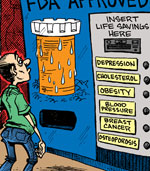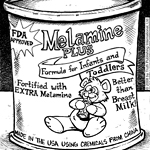What We Know About Vitamin A
| Share on Facebook | Share on Twitter | Share on Google+ |
Vitamin A is fat-soluble nutrient that occurs naturally in two different forms. One is retinol, is a ready-made nutrient that is only found in animal food sources.
The other is a pro-vitamin form, known as carotene, which is only converted to retinol when needed. This is found in both animal and plant food sources.
How Vitamin A Can Help You
This vitamin is an essential nutrient for maintaining eye health: it counteracts night blindness and helps in the treatment of many eye disorders.
Your body also needs this micronutrient for the formation and maintenance of skin, hair, teeth and bones.
It is also known as "the anti-infective vitamin" because it enhances the body's natural defense system by increasing white blood cells (T-cells) and antibody production.
Natural Sources
The ready-made form is found in animal sources such as liver, fish liver oil, eggs, and milk. The pro-vitamin type is found in yellow and green vegetables, including broccoli, carrots, peppers, squash, and is also present in yellow fruits.
What are the symptoms of a deficiency?

Vitamin A is stored in the liver and the body uses it from this source when the intake of retinol or carotene is low. Therefore, a deficiency will not occur in short term. But because the absorption of this nutrient depends on the presence of fat, any fat absorption problems can lead to a deficiency.
Vitamin A deficiency may lead to eye disorders such as night blindness, as a result of damage to the eye's cornea. The body's ability to fight infections also decreases as the deficiency weakens the immune system.
Vitamin A Toxicity and the Right Dosage
The RDA (Recommended Daily Allowance) value is 4,000-5,000 IU daily. There is no formal RDA for beta-carotene but between 10,000 and 15,000 IU is the equivalent of the RDA value. Because excess amounts of this nutrient can produce toxic side effects such as bone pain, hair loss, fatigue and headaches, you must only take dosages exceeding 15,000 IU per day under strict medical supervision.
Choosing Vitamin A supplements wisely
Should we include a vitamin A supplement in our daily diet? Answers to this question vary. While one scientific study concludes that large amounts can help to prevent the development of cancer epithelial cells, another states that it does not.
What we can say for certain is that a diet that includes beta-carotene from natural foods can help reduce the risk of cancer. The reason behind this is nor certain, but may be because of the synergy of beta-carotene with other carotenes and nutrients contained in the food itself.
We believe that using high dosage supplement can produce health risks in the long-term and should be considered only in specific deficiency conditions.
On the other hand, beta-carotene is converted into retinol only when body needs it, therefore your body will not be under any toxicity risk as it would be from vitamin A. Moreover, beta-carotene is an antioxidant that helps the cells in neutralizing the free radicals in the body.
Using beta-carotene seems to be a better solution especially if a supplement contains other carotenes and nutrients.
Here are some more tips on choosing the right supplement:
- Synergy with Other Nutrients
Vitamin A is more effective if used together with B complex, vitamin C, D and E, calcium, phosphorus and zinc.
Therefore, using a scientifically formulated nutritional supplement containing appropriate amount of beta-carotene with other essential nutrients can increase health benefits.
- Buying from a Trustworthy Manufacturer
The supplement industry is loosely regulated in the U.S., so selecting the right supplement can be a bit like gambling with your health. Some products do not even contain the active ingredients listed, and others contain less or more than the amounts stated on the label. Even worse, some of them include other substances that could be harmful to your health.
Therefore, when buying vitamin A supplement or any dietary supplement, to ensure the purity and quality of the product, choose a manufacturer that follows the pharmaceutical GMP compliance, which is the highest standard available to ensure that manufacturing and quality control procedures are strictly adhered to.
More Vitamin A Related Articles
What is Vitamin A - What is vitamin A good for?
Vitamin a Benefits - What does vitamin A do? Let’s explore the common benefits of vitamin A.
Vitamin A Cream - What are the vitamin a benefits for skin?
Vitamin A Deficiency - What causes vitamin A deficiency? What are the common vitamin A deficiency symptoms?
Vitamin A Foods - What foods contain vitamin A? A look into the foods high in vitamin A.
Vitamin A Toxicity - How much is too much vitamin A?
Vitamin A Palmitate - How to support your health with Retinyl Palmitate (Vitamin A Palmitate).
-
Skin CareMen Skin Care
-
Free ResourcesFree eBooks
-
The... patient should be made to understand that he or she must take charge of his own life. Don't take your body to the doctor as if he were a repair shop.Quentin Regestein
-
Featured Health Supplement
 If you find a product that is as effective as Total Balance, and is better value for money, let us know and we will give you a refund equivalent to your entire purchases of Total Balance…retrospective.
If you find a product that is as effective as Total Balance, and is better value for money, let us know and we will give you a refund equivalent to your entire purchases of Total Balance…retrospective.
-



















